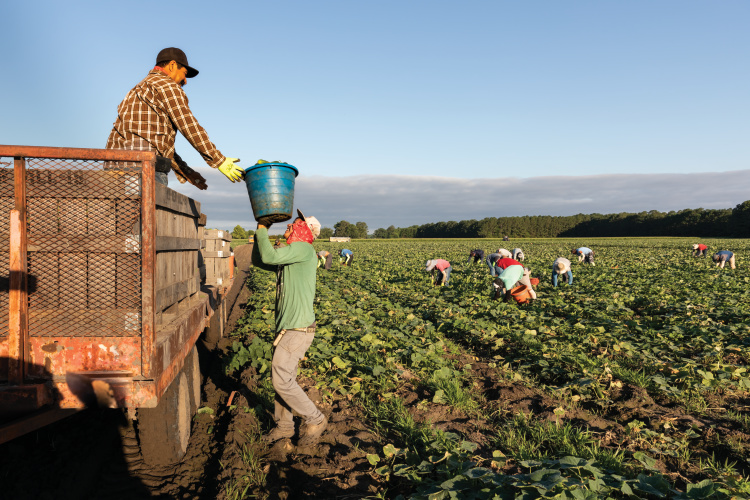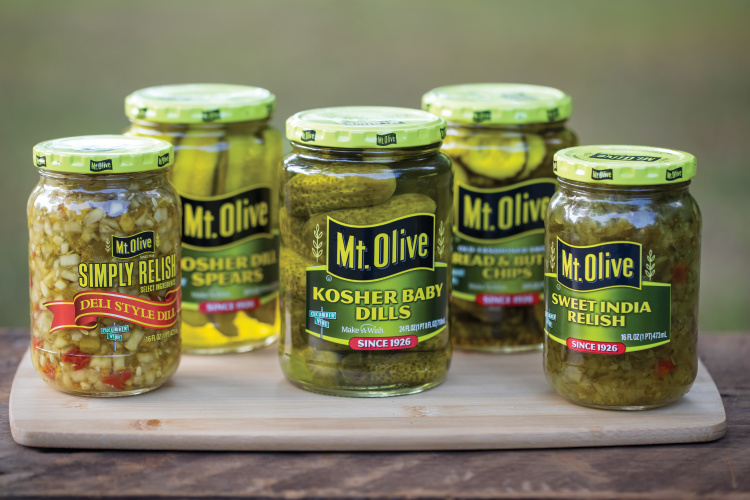Southeastern North Carolina Thrives on Cucumbers and Pickles
North Carolina proudly ranks third in the nation for cucumbers harvested, producing more than 156 million pounds of the crop in 2021.
Danielle Rotella Adams |
From the Latin name “Cucumis,” cucumbers originated in India more than 4,000 years ago and had a strong influence on early Egyptian and Greek cuisine. Christopher Columbus later introduced cucumbers to the Western world in the late 1400s, and from there, cucumbers became a global delicacy.
According to the National Agricultural Statistics Service, North Carolina proudly ranks third in the nation for cucumbers harvested, with more than 10,000 acres producing more than 156 million pounds in 2021. Sampson County leads the production, but the state grew more than $29.6 million worth of the veggie in 2021.
See more: Fresh Summer Recipes to Make With North Carolina Cucumbers and Pickles

Cultivating Cucumbers
Part of the Cucurbitaceae plant family, along with squash and melon, cucumber plants grow in two forms, vine or bush, requiring full sun and well-drained soil. Because cucumbers are 90% water, they need more irrigation than other vegetables.
“We irrigate cucumber plants almost every day during growing season depending on the rainfall,” says Reggie Strickland, a seventh-generation farmer with Strickland Farming Group in Sampson County. “Cucumbers don’t require a lot of water but do require a little water every day.”
See more: Farm Facts: Cucumbers & Pickles
Cucumber seeds are first planted in April, then more are planted in May and June, with the average time from seeding to first harvest being 40 days.
“We begin harvesting cucumbers in June and continue every day until early September,” Strickland says.
Growing cucumbers is more intense than growing other crops due to the daily field inspections growers perform to look for diseases and insects. Harvesting cucumbers is done by hand, requiring much labor, which is another difficult part of growing the veggie.
“Managing the labor for the harvest schedule is the biggest challenge,” Strickland says. “It’s really hard, tough work in the hottest time of the year.”

From Field to Fermented
Unlike other crops, cucumbers are sold at a fixed price and quantity, making it a more stable and less risky crop for growers. One of the biggest cucumber buyers in North Carolina is Mt. Olive Pickle Company on the corner of Cucumber and Vine in Mount Olive. Mt. Olive is one of the largest independent pickle companies in the U.S. and Strickland Farming Group’s primary cucumber buyer.
“We know what they’re looking for and what we’re going to get paid because they need a certain amount of cucumbers each day to run through their facility to control their volume and maximize production,” Strickland says.
Packing more than 200 million jars of processed and fresh pack pickles, relishes and peppers each year, Mt. Olive Pickle receives more than 70 million pounds of cucumbers from independent growers in North Carolina, around a third of their overall cucumbers. Fresh cucumbers are also grown in 11 other states and grown for two main crops – fresh cucumbers and pickled cucumbers.
See more: Recipe of the Month: Dill Pickles Made Sweet

Pickling and Packing
Pickle-making today isn’t a whole lot different than how it started in 1926 when Mt. Olive Pickle Company was first established.
“It’s the scale of the process, the larger volume and transitioning to state-of-the-art equipment that’s changed over the years,” says Lynn Williams, public relations manager for Mt. Olive Pickle.
See more: Miss Jenny’s Pickles Causes Pickle Palooza
Since the company receives cucumbers in the summer, it uses 1,100 brine tanks to store fresh cucumbers, and can house 40 million pounds of cucumbers in the tank yard.
“We have great relationships with excellent growers in North Carolina, and as a company, we’re very committed and rooted in our community,” Williams says.
From the time fresh cucumbers arrive at the production facility, it only takes a few hours for them to be washed, cut into chips, spears or stuffers, then packed, jarred and covered in brine. Then jars are capped, pasteurized, labeled and prepared for shipping.

Pick a Peck of Pickles
“People may be surprised by all that goes into a jar of pickles,” Williams says. “It represents a whole lot of what we do, how we’re organized, the scale of our production and our quality control process to make sure consumers are happy when they open a jar of Mt. Olive Pickles.”
See more: 9 Reasons to Visit the Goldsboro Area
It’s this commitment to their legacy and high quality that makes Mt. Olive Pickles the No. 1 best-selling brand of pickles, peppers and relishes in the country.
“We make your burger better,” Williams says. “But it’s that little thing that has fueled a company and generations in a community in big ways and small.”
– Danielle Rotella Adams
Mt. Olive Pickle Company doesn’t offer public tours of its plant, but it does have a dill-lightful gift shop at its headquarters on the corner of Cucumber and Vine that’s open to the public. Visitors can find all things pickles, like pickle T-shirts, golf putters, Christmas ornaments and, of course, tons of pickles! Open weekdays from 8 a.m. to noon and 1 to 5 p.m. To learn more, find pickle-filled recipes and see a full selection of Mt. Olive products, visit mtolivepickles.com.If You Go



Looking to grow commercial cucumbers and wondering if y’all would buy them